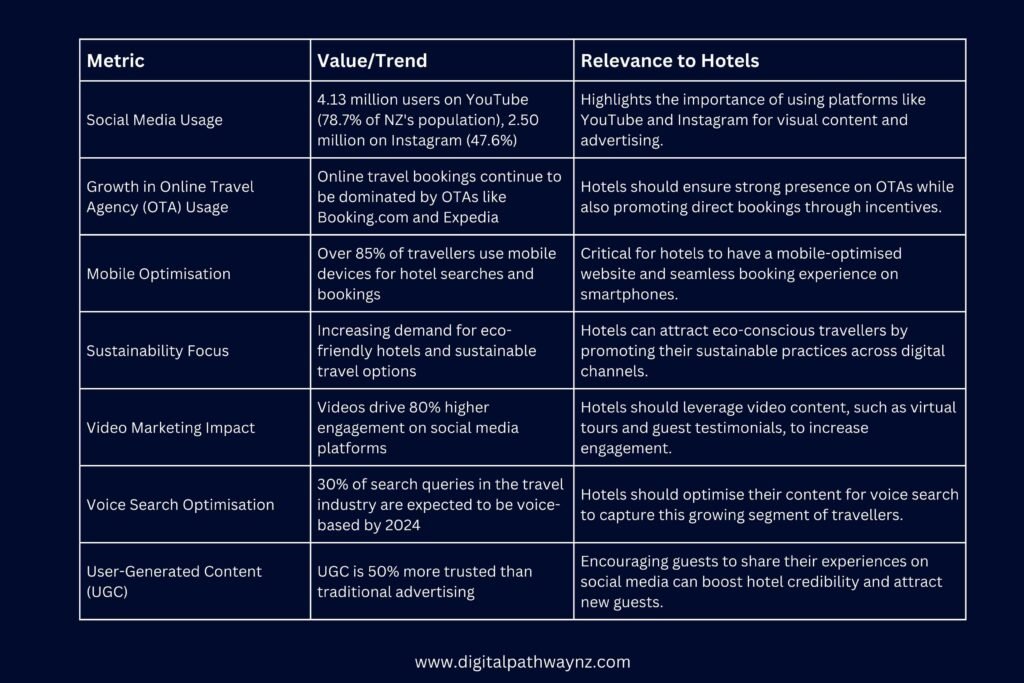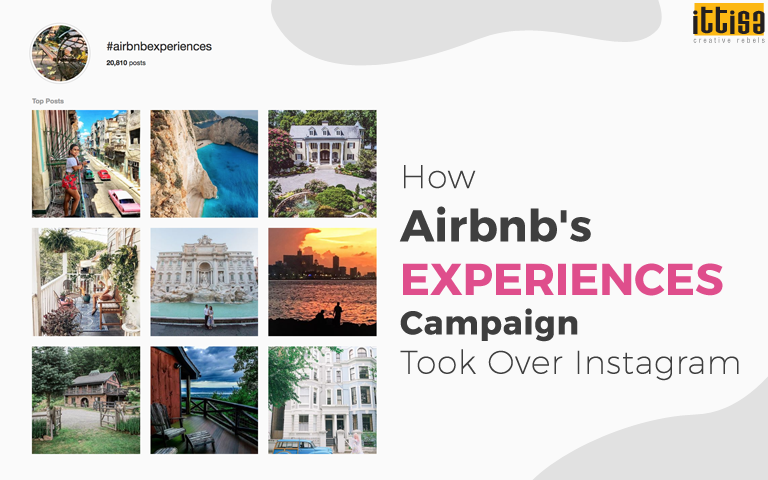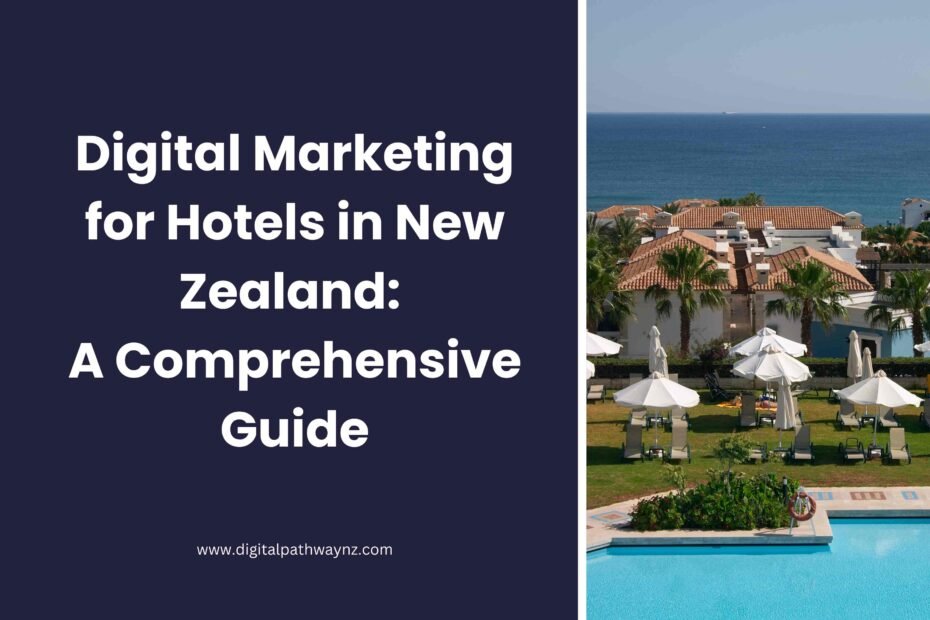As the hospitality industry in New Zealand continues to evolve, hotels must adapt to the digital landscape to remain competitive. With the increasing reliance on online research and bookings, effective digital marketing is crucial for hotels to attract guests, build brand loyalty, and boost revenue. This blog will explore the key channels, platforms, trends, and best practices that hotels in New Zealand can leverage to enhance their digital marketing efforts.
- Understanding the Importance of Digital Marketing for Hotels
- Key Digital Marketing Channels for Hotels
- Platforms for Digital Marketing in the Hospitality Industry
- Current Trends in Digital Marketing for Hotels
- Examples of Successful Digital Marketing Campaigns
- Best Practices for Digital Marketing in the Hotel Industry
- Conclusion
Understanding the Importance of Digital Marketing for Hotels

In the digital age, travellers are increasingly using online platforms to research, compare, and book accommodations. For hotels in New Zealand, this means that having a robust digital marketing strategy is no longer optional—it’s essential. Digital marketing helps hotels reach potential guests at every stage of their journey, from initial research to booking and beyond. By leveraging the right channels and platforms, hotels can engage with their audience, build brand awareness, and ultimately drive more bookings.
Key Digital Marketing Channels for Hotels
To effectively reach and engage with potential guests, hotels should focus on a mix of digital marketing channels. Each channel offers unique opportunities to connect with different segments of the audience.
1. Search Engine Optimisation (SEO)
SEO is the process of optimising a website to rank higher in search engine results pages (SERPs). For hotels, this means ensuring that your website appears when potential guests search for accommodations in your location.
- Local SEO: Focus on optimising for location-based keywords such as “hotels in Queenstown” or “luxury accommodation in Auckland.” This includes claiming and optimising your Google My Business listing, encouraging guest reviews, and ensuring your hotel is listed on local directories.
- Content Marketing: Create valuable content that answers common travel questions, such as blog posts on “Top Things to Do in Wellington” or “Best Restaurants Near Auckland CBD.” This not only attracts organic traffic but also positions your hotel as a trusted local expert.
2. Pay-Per-Click (PPC) Advertising
PPC advertising allows hotels to appear at the top of search results for targeted keywords by bidding on them in platforms like Google Ads.
- Google Ads: Use Google Ads to target specific keywords relevant to your hotel, such as “best beachfront hotels in New Zealand.” Set up retargeting campaigns to reach users who have visited your website but didn’t complete a booking.
- Display Ads: Consider running display ads on travel-related websites or through Google’s Display Network to increase brand visibility among potential guests.
3. Social Media Marketing
Social media platforms like Facebook, Instagram, and LinkedIn offer hotels the opportunity to engage with a wide audience through organic posts and paid advertising.
- Instagram: Showcase the visual appeal of your hotel through high-quality images and videos. Use Instagram Stories to highlight special offers, behind-the-scenes content, and guest experiences.
- Facebook: Leverage Facebook’s targeted advertising capabilities to reach specific demographics, such as families looking for holiday accommodations or business travellers.
- LinkedIn: Focus on B2B marketing by promoting your hotel as the ideal venue for corporate events and meetings.
4. Email Marketing
Email marketing is a powerful tool for nurturing relationships with past guests and encouraging repeat bookings.
- Personalised Campaigns: Segment your email list based on guest preferences and behaviours. Send personalised offers, such as discounts on future stays or special packages for loyalty members.
- Automated Emails: Set up automated emails to send booking confirmations, pre-arrival tips, and post-stay follow-ups. These emails can enhance the guest experience and keep your hotel top-of-mind.
5. Content Marketing
Content marketing involves creating and distributing valuable content to attract and engage your target audience.
- Blogging: Regularly publish blog posts that provide travel tips, local guides, and hotel news. This can improve your SEO efforts and establish your hotel as a go-to resource for travellers.
- Video Marketing: Create engaging videos that showcase your hotel’s amenities, rooms, and local attractions. Share these videos on your website, YouTube, and social media platforms.
Platforms for Digital Marketing in the Hospitality Industry
Choosing the right platforms is essential for maximising the impact of your digital marketing efforts. Here are some key platforms hotels in New Zealand should consider:
1. Google My Business
Google My Business is a must for hotels, as it allows you to manage your online presence across Google Search and Google Maps. A well-optimised listing can significantly improve your local SEO and make it easier for potential guests to find you.
2. TripAdvisor
TripAdvisor remains one of the most influential platforms in the travel industry. Ensure your hotel’s profile is complete, regularly updated, and actively monitored for reviews. Encourage satisfied guests to leave positive feedback, as reviews play a crucial role in influencing booking decisions.
3. Booking.com and Expedia
Online Travel Agencies (OTAs) like Booking.com and Expedia are major players in the hotel booking market. While these platforms charge commissions, they can also drive significant bookings and increase your hotel’s visibility to a global audience.
4. Social Media Platforms
Facebook, Instagram, LinkedIn, and even TikTok offer diverse opportunities for hotels to engage with different audience segments. Whether through organic posts, paid ads, or influencer partnerships, these platforms help hotels build brand awareness and drive bookings.
Current Trends in Digital Marketing for Hotels
To stay ahead in the competitive hospitality industry, it’s important for hotels to keep up with the latest digital marketing trends. Here are some trends that are currently shaping the industry:
1. Personalisation
Guests now expect a personalised experience, both online and offline. Use data from previous stays, website interactions, and email campaigns to create tailored offers and recommendations. Personalisation can significantly increase guest satisfaction and encourage repeat bookings.
2. Mobile Optimisation
With more travellers using mobile devices to research and book hotels, having a mobile-optimised website is crucial. Ensure your website is responsive, with fast loading times, easy navigation, and mobile-friendly booking processes.
3. Sustainability Messaging
As more travellers prioritise sustainability, hotels in New Zealand can stand out by promoting their eco-friendly practices. Highlight your hotel’s commitment to sustainability through your website, social media, and email marketing.
4. Voice Search
Voice search is becoming increasingly popular, with many travellers using voice assistants like Siri or Google Assistant to find and book hotels. Optimise your website content for voice search by incorporating natural language and answering common questions directly in your content.
5. User-Generated Content
Encourage guests to share their experiences on social media and tag your hotel. User-generated content not only provides authentic marketing material but also helps build trust with potential guests.
Examples of Successful Digital Marketing Campaigns
To illustrate how these strategies can come together, let’s look at some examples of successful digital marketing campaigns in the hospitality industry:
1. Hilton’s “Stop Clicking Around” Campaign
Hilton’s global “Stop Clicking Around” campaign encouraged direct bookings by offering discounts and benefits to Hilton Honors members who booked directly through the hotel’s website or app. The campaign utilised a mix of email marketing, social media, and PPC ads to reach a wide audience and reduce reliance on OTAs.
2. Airbnb’s Instagram Strategy

Airbnb leverages Instagram to showcase unique properties and experiences through stunning visuals. By partnering with influencers and encouraging user-generated content, Airbnb has built a strong brand presence on the platform, attracting millennial travellers looking for unique stays.
3. Marriott’s Content Marketing

Marriott has successfully used content marketing to position itself as a travel authority. The brand’s “Marriott Bonvoy Traveler” blog offers travel guides, tips, and inspiration, driving traffic to the Marriott website and encouraging bookings.
Best Practices for Digital Marketing in the Hotel Industry
To maximise the effectiveness of your digital marketing efforts, consider the following best practices:
1. Consistent Branding
Ensure that your hotel’s branding is consistent across all digital platforms. This includes your website, social media profiles, email marketing, and online advertisements. Consistent branding helps build trust and recognition among potential guests.
2. Focus on Quality Content
High-quality content is key to engaging your audience and improving your SEO. Whether it’s blog posts, videos, or social media updates, make sure your content is informative, engaging, and aligned with your brand’s voice.
3. Leverage Data and Analytics
Use data and analytics to track the performance of your digital marketing campaigns. Tools like Google Analytics, Facebook Insights, and email marketing platforms can provide valuable insights into what’s working and where there’s room for improvement.
4. Engage with Your Audience
Respond promptly to reviews, comments, and messages on social media and review platforms. Engaging with your audience shows that you value their feedback and are committed to providing excellent service.
5. Adapt to Changing Trends
The digital landscape is constantly evolving, so it’s important to stay updated on the latest trends and technologies. Regularly review and adjust your digital marketing strategy to ensure it remains effective in reaching your target audience.
Conclusion
Digital marketing is a powerful tool for hotels in New Zealand to attract and retain guests in an increasingly competitive market. By focusing on key channels, leveraging the right platforms, staying on top of current trends, and following best practices, hotels can enhance their online presence and drive more bookings. Whether you’re a boutique hotel in the heart of Auckland or a luxury resort in Queenstown, a well-executed digital marketing strategy can help you connect with travellers, build brand loyalty, and achieve long-term success.
